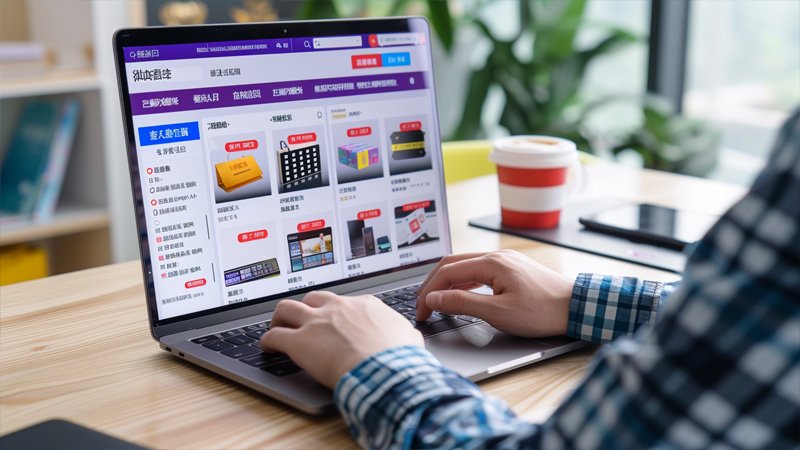
I’ll never forget how finding the right sourcing agent transformed my business—and saved me sleepless nights.
You can discover reliable China sourcing agents through online platforms, trade shows, professional networks, and local association recommendations.
It’s simpler than it sounds.
What are the best online platforms to find sourcing agents in China?
Online listings give me an easy start.
Popular e-commerce sites, B2B platforms, and specialized directories host qualified agents ready for diverse sourcing needs.

I started by checking Alibaba1 and Global Sources, mainly because they’re well-known hubs for anyone seeking Chinese products. The real advantage? I could read reviews from other buyers, compare agent profiles, and see a glimpse of their reliability. Sites like Made-in-China2 also served up a range of professionals, some even with verified badges to prove their credentials. But let’s face it: these are huge marketplaces. You’ll likely need to do some digging and filter out the noise.
Discovering Gems Online
One trick is to look at forums or social media groups dedicated to importing from China. People there often drop direct recommendations, share stories of good (and bad) experiences, and even link to agent websites. I’ve found new leads by joining groups specifically for my industry—like apparel or electronics—where other members happily shout out agents they trust. It’s like finding a new café through a friend’s glowing review—it spares you from awkward trial and error.
I also prefer setting up a quick video call with potential agents3 I find online. It helps me sense how responsive and knowledgeable they are. If they dodge calls or give one-sentence answers, that’s a red flag. But an agent who enthusiastically explains their process or references past projects usually earns a spot on my shortlist. Of course, I don’t rely solely on platform ratings. I’ll cross-check their digital footprint—LinkedIn pages, official websites, maybe a mention in a business directory. It’s a bit of detective work, but it’s worth it to sift out the amateurs.
In my experience, these platforms are a good starting point, but you still need that personal vetting step. The best leads tend to pop up when you blend online research with real-world references—like hitting up an industry friend who’s trodden the same path. Still, if you want a broad view of who’s out there, these sites are gold. They’ll help you glimpse dozens of agents in a single search, giving you a sense of the going rates, experience levels, and specialized niches in your field.
What are the advantages of attending industry trade shows to find procurement agents?
Meeting face-to-face builds trust fast.
Trade fairs let you meet agents in person, evaluate product samples, and establish direct rapport for lasting partnerships.

I clearly remember my first visit to the Canton Fair. Rows upon rows of booths, colorful displays, and a buzzing atmosphere that made me feel like a kid in a candy store. But it wasn’t just about products. Procurement agents were strolling the aisles too, eager to connect with potential clients. Being on the ground helped me see who was genuinely well-connected and who was mainly just talk.
Making the Most of Trade Shows
For starters, there’s something about face-to-face contact4 that cuts through the uncertainty. You can shake hands, pick up a sample, and watch how an agent interacts with factory reps. I’ve learned that the best agents often have a natural ease about them, moving from booth to booth with total confidence. They know the suppliers personally and can arrange introductions on the spot.
Attending trade fairs5 can also help you benchmark pricing and quality. Picture a giant marketplace where you can compare five different suppliers all within a few steps. An experienced agent can swiftly guide you, explaining manufacturing capabilities or pointing out what sets a particular factory apart. This insider knowledge is priceless when you’re on a tight schedule. Plus, being in a live setting means no email lag—you can finalize some details right there if everything lines up.
One tip? Plan ahead. Look at the exhibitor list, mark down relevant booths, and schedule possible meetings with agents you suspect might attend. I learned the hard way that going in blind can be overwhelming. Once, I wandered for hours without a clear direction and ended up missing key contacts. The next time, I arrived with a targeted list, which helped me track down two great agents who specialized in my niche. They ended up handling multiple product lines for me, saving me from countless shipping fiascos. If you’re serious about forging strong connections, trade shows are definitely worth the plane ticket.
How can you utilize professional networking resources to locate top sourcing agents?
I’ve leveraged LinkedIn and local chambers of commerce6 many times.
Professional networks let you find vetted contacts, cross-check credentials, and spark valuable referrals.

In my experience, building a strong professional circle can sometimes outperform random online searches. When I dove into LinkedIn, I discovered entire groups dedicated to imports, exports, and Chinese manufacturing. Joining those communities connected me with people who’d been there, done that. They’d post tips, share cautionary tales, and occasionally recommend agents they personally trusted. It felt more personal than an anonymous online review because I could see their profiles, their job histories, and even the endorsements from colleagues.
Creating Solid Networking Paths
Don’t underestimate the power of local business associations or your country’s chamber of commerce in China. These groups often have committees or special interest sections dedicated to trade. If you pop in for a meeting or event, you might rub elbows with importers who can drop a few agent names. Sometimes, the chamber can provide a short list of recognized agencies that meet specific credibility standards. For me, that’s a safety net.
Also, I’ve used web-based professional directories7. They’re not just job-seeking portals; some allow you to search by specific expertise, like “sourcing agent in electronics.” Reaching out directly with a friendly yet detailed message can yield surprising results—especially if you mention a common interest or connection. Don’t be shy about stating your exact needs. Are you looking for someone who specializes in small MOQs or who can handle shipping to multiple countries? Be upfront. In my experience, clarity from the get-go helps weed out unfit candidates.
Whenever I meet a new contact, I do a little background check. Check out their posts, comments, and mutual contacts to gauge if they’re active or recommended. I’ve been pleasantly surprised at how a single LinkedIn intro has led me to an agent who’s now handled over ten of my purchase orders. Professional networks can be a direct highway to genuine leads—no middlemen, no guesswork—just real people who might have exactly what you’re looking for.
Where can you find lists of sourcing agents recommended by local business associations?
Local chambers often maintain curated lists of vetted agents.
Contact regional trade offices or industry groups for reliable, pre-screened procurement agent rosters.

Some of the best leads I’ve ever gotten came from a simple phone call to my local trade association8. They had an entire directory of sourcing agents who had undergone at least some form of verification. The process usually involves checking business licenses, client references, or membership in recognized trade bodies. It’s not foolproof, but it’s a big step up from blindly trusting an internet ad.
Exploring Association Resources
In many countries, the chamber of commerce organizes events where Chinese suppliers and sourcing agents showcase their services. Sometimes, these associations publish annual guides or “who’s who” directories. When I flip through them, I know the entries have at least some official endorsement or screening. That sense of legitimacy eases my mind—and I like seeing them specify each agent’s niche, like textiles or electronics, so I can quickly see if they match my needs.
Here’s an idea: if you’re traveling to China for business, contact your local consulate or embassy. They often maintain lists of recommended service providers, including procurement agents. While they might not personally guarantee them, you at least get a starting point. I’ve done this and found that some of those suggested agents had gone through certain government or export body checks, which helped me gauge their seriousness and reliability.
Industry associations back home can also help. For instance, if I’m in the furniture sector, there might be a national furniture association9 that regularly interacts with Chinese manufacturers. Reaching out for a referral can place me in contact with an agent who’s already proven themselves within that niche. I’ve learned that tapping into these networks not only streamlines the search but also gives me more leverage when negotiating terms. If the agent knows you’ve come through a respected association, they’ll often go the extra mile—both in quality and pricing—because they value maintaining a good standing in that community.
Conclusion
Finding China sourcing agents is easier with a plan: go online, hit trade shows, leverage networking, and check association recommendations.
-
Explore Alibaba to discover a vast marketplace for sourcing products, complete with buyer reviews and agent profiles. ↩
-
Check out Made-in-China for a range of verified professionals and insights into their credentials and reliability. ↩
-
Learn why setting up a video call can help you gauge the responsiveness and expertise of potential sourcing agents. ↩
-
Understanding the significance of face-to-face interactions can transform your approach to building trust and rapport in business. ↩
-
Exploring this resource will provide insights into how trade fairs can enhance your networking opportunities and business growth. ↩
-
This link will help you understand the role of local chambers in fostering business relationships and providing credible referrals. ↩
-
Discovering top directories can streamline your search for specialized agents, making your networking efforts more effective. ↩
-
Local trade associations can provide valuable connections and resources for finding trustworthy sourcing agents in your industry. ↩
-
Exploring the national furniture association can reveal essential insights and connections for sourcing agents in the furniture sector. ↩




